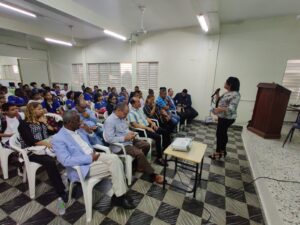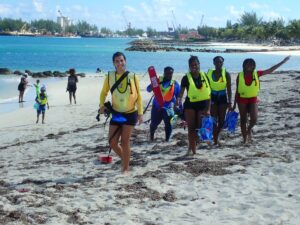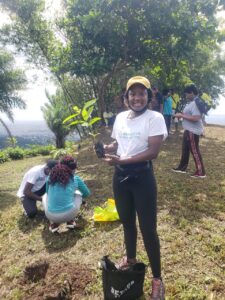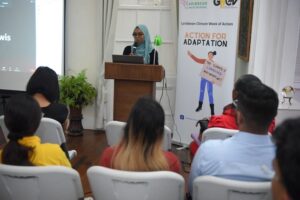
During the month of October, climate and community leaders from 10 nations have been involved in planning and hosting events to gather ideas and build pressure on the need to take urgent adaptation measures that keep communities safe against the effect of climate change.
From Guyana to the Dominican Republic, climate activists across the Caribbean are participating in Action for Adaptation, an event organized by the Caribbean Climate Network (CCN) and partnering organizations and individuals across the region. This initiative brings together people from across the region who are already seeing the devastating effects of the climate crisis on their communities and are calling for urgent adaptation measures to be taken that can protect people’s health and lives.
This initiative is hosted by the Caribbean Climate Network (CCN), an initiative anchored by 350.org, in partnership with local organizations, that is mobilizing to support activists who want to ensure that their countries adopt the necessary measures that will protect lives and property in the coming years. Along with CCN, partnering organizations are leading events throughout the month of October such as conferences, marches, coastal tree planting efforts, community dialogues, safety training, and education about mangroves and their importance in protecting infrastructure and ecosystems.
“People across the Caribbean are aware of how the climate crisis will impact their lives and they know that we must mobilize and take the actions necessary to protect ourselves, adapt to climate change, and demand a better environment and society free of polluting industries that continue to cause havoc. We are hopeful and believe in our power and knowledge” Amira Odeh, senior organizer at 350.org and CCN director.
In Guyana, the Guyana Youth and Environment Network (GYEN) hosted a youth symposium and launched a children’s storybook that is based on the effects of climate change on communities, the importance of groundwater in the face of a flood, while also shining light on renewable energy. “This week of action provides us with the platform to educate and empower youth with knowledge on how climate change is affecting us, what we are doing as a country and how we can adapt,” said Dionne Barnwell, author and member of GYEN.
Also in Guyana, a community picnic was held where people gathered to talk about needs and solutions. “Our conversation centered around race, class, and how those are issues that we need to address if we intend to form mass movement within the country for climate action. We talked about changing culture and mindset and working with indigenous peoples in Guyana. We spoke about young people and how they are often overwhelmed when it comes to the oil and gas development in Guyana”, explained Christine Samwaroo from The Breadfruit Collective.
In Trinidad and Tobago, a ‘hike and plant’ was hosted by UWI Biological Society and Eco-Titans Community. In addition, an emergency go-bag training was led by volunteers as well as a Community Climate Café. “We encourage other communities and islands throughout the Caribbean to engage in activities to protect and restore key ecosystems such as watersheds, as they play a vital role in our well-being, health and lives,” said Darien Jones, Eco-Titans Community leader.
Climate leaders in Grenada hosted a mangrove awareness and protection activity and are working on an educational ad about climate adaptation and its benefits.
Dominican Republic environmental groups Fundación Ozama RD Verde and Proyecto Ecologico Macoris Verde hosted events where they involved youth and government officials in conversations about local adaptation needs and projects plus a declaration asking the government to push for these measures urgently. A coastal tree planting activity was also held with participants from local schools in an effort to protect the coast from erosion and sea level rise.
The Caribbean Centre of Excellence for Sustainable Livelihoods in Barbados held a session on ways to support adaptation actions being taken by entrepreneurs across the region. Also, Walkers Institute for Regenerative Research Education and Design (WIRRED) held a day of Climate Action at Walkers Reserve where coastal tree planting and protection activities were done in a 277-acre space that has been regenerated from a sand quarry to a living laboratory and thriving model of climate resilience
In Puerto Rico, an organization dedicated to Coastal Conservation, CoCo PR, led an initiative about climate adaptation education to community members along with efforts to give solar lamps and water filters to families recently affected by Hurricane Fiona. In addition, various school teachers will hold events in the following weeks where they will involve their students in immersive activities where they will learn about climate, propose solutions, teach others in the community and ask their town officials for attention on the issue.
Jamaica climate leader Tracey Edwards is currently hosting a competition that involves local schools and churches, engaging youth in climate adaptation solutions. And the organization BREEF in the Bahamas decided to also involve youth in a day of snorkeling and learning about how these ecosystems protect our health and lives.
More events will continue happening during the month in Cuba, Haiti, Puerto Rico, and Grenada, all led by local experts and volunteers who want to elevate and expand the knowledge and efforts to protect their communities against the effect of climate change.
The Caribbean Climate Network is part of 350.org, a global organization dedicated to fighting climate change and building clean energy for all. 350.org has teams all over the world and has achieved major wins like fighting against pipelines and supporting youth during the thousands of Climate Strikes events in September 2019.




For the last five years not a day has passed without hearing these words ‘ climate change’, ‘climate resilience’ used by regional governments and their cronies.
I look around and hardly any thing has been done by these corrupt, inactive, regional governments to mitigate against the destruction caused by the changing climate patterns.
The many millions that have been spent and donated to this cause would have been better spent on poverty alleviation, human development, education and crime prevention.